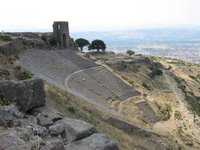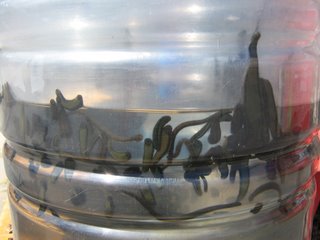


The photos from top are:
- Protest site Abdi Ipecki Park. The statue depicts the hands of a worker, the sculptor who made the work in the 1970s, has visited the site and given TAYAD his support.
- This poster shows the 122 people who have died in death fasts and asks - how many more have to die?
- TAYAD activists Semiha, Aysu & Denis.
article below from Green Left Weekly www.greenleft.org.au
Turkish activists demand "End isolation! Close the F-type prisons"
Since 1982 122 people have given their lives in a struggle for the human rights of political prisoners in Turkey in unlimited hunger strikes, known as death fasts. This year marks the 20th anniversary of the formation of TAYAD (Association of Solidarity with the Families of Prisoners) whose members continue to work heroically inside and outside Turkey to draw attention to the struggle of their sons, daughters and friends. TAYAD's history goes back to the 1980 military coup when thousands of revolutionaries and progressives were thrown into Turkish jails. Attempting to crush prisoner organisation, the military junta introduced the practice of isolation or solitary confinement. Death fasts became the only form of resistance left to the prisoners. In 2000 this resistance became widespread with 840 prisoners across Turkey declaring themselves on death fast. In response the Turkish state attacked 20 prisons in an attempt to transfer resisting prisoners to new F type prisons, purpose built for isolation. In the process, 6 women prisoners were burned alive and another 22 prisoners died from gunshot wounds. Six hundred prisoners suffered serious physical and psychological harm as a result of force feeding. Today five people are on death fast in Turkey - Kamil Karitas, Sevgi Saymaz, Serpil Cabadan, Gulcun Goruroglu and lawyer Behic Asci. Currently TAYAD activists estimate there are between 600 and 1000 people held in isolation for holding revolutionary socialist beliefs. Another 3000 Kurdish political prisoners are held in Turkish jails. Green Left Weekly's Ruth Riordan and Simon Cooper spoke with TAYAD activists Aysu, Denis and Semiha in Ankara's Abdi Ipekci Park,where members of the organisation have held a continual protest for over 1000 days.
Semiha's 20 year old son, Ugur, has been imprisoned since January 2005. "At first when my son was 16 and became a political activist, I was thinking only of my son. But after he was put in prison and I realised one day he could be on death fast because of isolation, I realised this affected many more people so I am here for my son but also for the sons and daughters of other people" she told Green Left. Aysu added, "First I'm here because I'm a human being and I'm a mother. I know isolation is a big problem and I have to do something about it, so I am here".
When asked about the effects of isolation, Aysu replied, "the one hundred and twenty two people who have died show us what isolation causes. When prisoners come out of isolation, sometimes they have forgotten everything. It can cause hearing, sight and balance problems. When we go to visit prisoners sometimes the guards attack us - so we have to wonder, what can they do to our sons or daughters".
"Sometimes our letters don't get through to the prisoners, sometimes we send gifts like dried flowers but the prisoners don't receive them. The letters we receive are sometimes censored", Semiha added. The prisoners have limited visiting rights with family members sharing the same last name but this is arbitrarily denied by prison authorities.
TAYAD activists in Abdi Ipekci Park have suffered much police harrasment. "They are always attacking us" said Denis, who 2 months earlier had his nose broken by a police baton at a protest. On June 11 TAYAD activists gathered to mark 1000 days of protest at Abdi Ipekci Park, when they attempted to march towards parliament police attacked using gas bombs and truncheons, many protestors required hospitalisation.
Unsurprisingly, the TAYAD activists report that some people who sympathise with their cause are afraid to visit the protest and show their support but others bring flowers. "In general, people are very good and supportive" Aysu reported.
When asked what people could do to support TAYAD's struggle the activists replied that isolation needed to be understood in its global context. "First they isolate countries - Vietnam, Afghanistan, Iraq - then they isolate people. We have to make imperialism change. In Turkey we have act to change isolation but these prisons are supported economically by Europe and the USA. Turkish prisons are not much different from Guantanamo", Aysu concluded.
"In Turkey there is a media blackout on our protests so it is important to spread the word internationally, let people know what is happening in Turkish prisons and maybe get parliamentarians internationally to discuss isolation" Semiha added.
Aysu, Semiha and Denis all agreed that the Turkish government, police and military are afraid of TAYAD. "They know our demands are revolutionary" said Aysu "they will always attack TAYAD but we will stay here and we will win".
to show your support for Turkish prisoners email sydtayadkomite@mynet.com or check http://www.tayad-committee.com/















